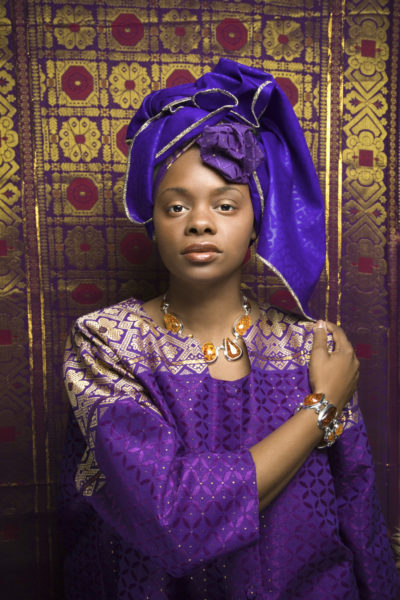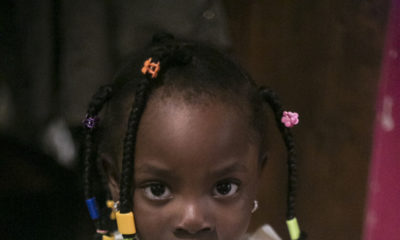Features
Love without Boundaries with Bukola Ayinde: Learn About Disability & Help Reduce the Ignorance
 A few weeks ago, a school proprietress called me to speak with a parent. The woman had withdrawn her son from school because someone had insulted her by referring to her son who had cerebral palsy in a cruel and demeaning manner. Last month, I met a proprietress who lost eighty percent of her students because she admitted a child with special needs. A parent who has a child living with cerebral palsy said the parents of the other children in his son’s class were grumbling about their children staying in the same class with his son.
A few weeks ago, a school proprietress called me to speak with a parent. The woman had withdrawn her son from school because someone had insulted her by referring to her son who had cerebral palsy in a cruel and demeaning manner. Last month, I met a proprietress who lost eighty percent of her students because she admitted a child with special needs. A parent who has a child living with cerebral palsy said the parents of the other children in his son’s class were grumbling about their children staying in the same class with his son.
One of my daughter’s therapists told me about one of her clients who locked herself at home and didn’t go out any more because she was being referred to as a mother of an imbecile. This woman went into depression and started gaining weight. Another friend told me about her experience with a boy who was attending school for the first time at the age of eight. He stood right there on the school field and stared at the blue sky. He was fascinated with the sky because that was the first time he was seeing it. His parents had kept him at home, away from questioning eyes.
I can go on and on….people living with disabilities suffer unduly because of the prevalence of ignorance in my society.
Some parents due to fear of rejection by their friends and the society, hide their children who have special needs. The children may not get access to medical care on time and therefore lose the opportunity for early intervention. When there is early intervention in any medical condition, it gives children a greater chance to correct their disabilities.
On the other hand, our society has a major role to play in disability management. Like I love to say, neurodevelopmental disorders such as autism, cerebral palsy, down syndrome are medical conditions and they are not contagious in any way.
People are usually afraid of what they don’t understand. To make our world a better place, some people dedicated their lives to studying the earth, the galaxies and they made some discoveries which served as a basis for numerous inventions that benefitted mankind. For a long time, people thought the earth was flat until it was disputed by early Greek Philosophers who asserted that the earth was round. Some people studied medicine and provided a cure for deadly diseases that could have wiped out mankind. If these people had allowed fear and superstitions to hold them back, mankind would still be in the Stone Age.
Until we begin to look at neuro developmental disorders as medical conditions which need to be treated or managed, we may not see much advancement in disability management in Nigeria.
According to Professor Afolabi Lesi, a neurologist with the University of Lagos, based on a research conducted by the university, out of ninety babies born in Nigeria, at least one is diagnosed with cerebral palsy. This does not take into cognizance children whose delivery was done by traditional birth attendants (TBAs), or mothers who gave birth in the church or those done at home. He also said that there are currently six hundred million persons with disabilities throughout the world, out of whom four hundred million live in developing countries and eighty million in Africa.
According to the world report on disability published in 2011, about twenty-five million Nigerians had at least one disability or the other. It is also estimated that over a million children living in Nigeria have autism. I visited a public primary school in Lagos State that admits children with disabilities. There were over seventy students with disabilities there.
It is also a fact that a good number of these children live to adulthood. This means that we have a society that has a large number of children with disabilities yet we are still denying or ignoring their existence.
The one thing we are yet to understand is that every living human being is a potential disabled person. Loss of limbs (caused by accident or diseases such diabetes), mental illness which includes loss of memory (common to old people) or damaged organs (resulting in kidney or heart disease) can make a person fall into that category. Not everyone was born with a disability. When people grow old, they begin to depend on others. They are not as strong as they used to be and cannot meet most of their needs. Sadly, there is little or no plan for these old people, usually called senior citizens, in Nigeria. No wonder we have very few old people’s homes in my country. No wonder the pensioners are not treated fairly by the government.
If we do not intentionally ensure that we teach people, especially children about disability, if we do not ensure that we promote laws that will benefit people living with disabilities; if we do not provide facilities or infrastructures to make life easier for people with disabilities, then we must pray fervently that we or our families do not eventually require these services.
Those who want to make life easy for people living with disabilities can take the following steps:
As an individual, what can you do differently today? Check Google and learn about different disabilities, (Autism, Cerebral Palsy, Down Syndrome, Learning Disability, Physical Disability etc.) how they can be prevented and how to get help (in case you see a helpless first-time mum).
Teach your children about disability; teach them to show empathy to people who have disabilities.
If you run a school, have a disability awareness day. Let the children understand that there are people with different medical conditions and appearances that may be different from theirs. Teach them to show empathy to others and stand against bullying.
If you own a company, reserve some positions for people living with disabilities.
If you are a teacher, learn about the best ways to teach children with disabilities.
Family members and family friends who relate with such children should be kind and show support.
Remember, evil prevails when good people keep quiet and do nothing.
Make a change in your world today.
Photo Credit: Dreamstime























